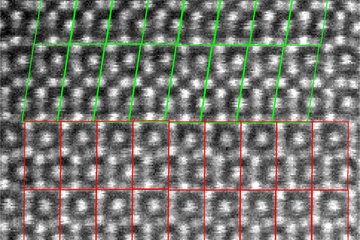All genres
41.
Journal Article
Single and double polymer layer arrangements of acid groups containing cellulose and basic groups containing polyethyleneimine on steel. Macromolecular Materials and Engineering 292 (12), pp. 1245 - 1255 (2007)
42.
Journal Article
Potential control under thin aqueous layers using a Kelvin Probe. Corrosion Science 49 (4), pp. 2021 - 2036 (2007)
43.
Journal Article
High Voltage Pulse Anodization of a NiTi Shape Memory Alloy. Journal of the Electrochemical Society 154 (6), pp. C294 - C298 (2007)
44.
Journal Article
Controlled etching of carbon nanotubes by iron-catalyzed steam gasification. Advanced Materials 19 (21), pp. 3648 - 3652 (2007)
45.
Journal Article
Release mechanism of electrodeposited polypyrrole doped with corrosion inhibitor anions. Journal of Solid State Electrochemistry 10 (9), pp. 730 - 736 (2006)
46.
Journal Article
In-situ Infrared Spectroscopic and Scanning Kelvin Probe Measurements of Water and Ion Transport Kinetics at Polymer/Metal Interfaces. Electrochimica Acta 51 (16), pp. 3303 - 3315 (2006)
47.
Journal Article
Discrete electrochemical transients of aluminium alloys generated by slurry jet impingement. J. Phys. D: Appl. Phys. 39, pp. 3157 - 3164 (2006)
48.
Journal Article
Electropolishing of NiTi shape memory alloys in methanolic H2SO4. Electrochim. Acta 52, pp. 1290 - 1295 (2006)
49.
Journal Article
Corrosion Protection of Zn-Phosphate Containing Water Borne Dispersion Coatings on Steel. Part 2: Corrosive de-adhesion of model films on iron substrates. Corrosion Science 48 (11), pp. 3716 - 3730 (2006)
50.
Journal Article
Corrosion protection of Zn-phosphate containing water borne dispersion coatings on steel. Part 1: Design and Analysis of Model Water Based Latex Films on Iron Substrates. Corrosion Science 48, pp. 3703 - 3715 (2006)
51.
Journal Article
Investigation of the effect of impingement angle on tribocorrosion using single impacts. Electrochim. Acta 51, pp. 6521 - 6526 (2006)
52.
Journal Article
On the development of polypyrrole coatings with self-healing properties for iron corrosion protection. Corrosion Science 47 (12), pp. 3216 - 3233 (2005)
53.
Journal Article
Ag/AgCl/KCl micro-electrodes as O2-insensitive reference tips for dynamic scanning Kelvin probe measurement. Electrochimica Acta 50 (13), pp. 2667 - 2674 (2005)
54.
Journal Article
Limited cladding for new steels. Stahl und Eisen 125 (3), pp. 112 - 114 (2005)
55.
Journal Article
Haftende Hüllen für neue Stähle. Stahl und Eisen 125 (3), pp. 112 - 114 (2005)
56.
Journal Article
Adhesion and de-adhesion processes at polymer/metal interfaces. Annual Reviews Materials Research 35, pp. 571 - 615 (2005)
57.
Journal Article
Adhesion and De-adhesion mechanisms at polymer/metal interfaces: Mechanistic understanding based on in situ studies of buried interfaces. Annual Review of Materials Research 35, pp. 571 - 615 (2005)
58.
Journal Article
Scanning Droplet Cell investigations on single grains of a FeAlCr light weight ferritic steel. Electrochimica Acta 51, pp. 978 - 983 (2005)
59.
Journal Article
Corrosion Stability of Polymer-Coated Metals - New Concepts Based on Fundamental Understanding. Corrosion 61 (12), pp. 1115 - 1126 (2005)
60.
Journal Article
Hans-Jürgen Engell - Preface. Zeitschrift fur Physikalische Chemie - International Journal of Research in Physical Chemistry & Chemical Physics 219 (11), pp. 1445 - 1446 (2005)











